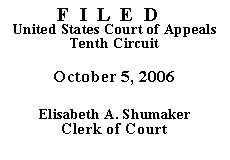

| BIVIAN B. RAMIREZ,
Petitioner - Appellant, v. JOSE ROMERO, Warden; and PATRICIA A. MADRID, Respondents - Appellees. |
|
Before MURPHY, SEYMOUR, and McCONNELL, Circuit Judges.
Ramirez pleaded guilty in New Mexico state court to one felony count of driving under the influence of alcohol or drugs; one misdemeanor count of driving with a suspended license; and one misdemeanor count of resisting, evading, or obstructing a police officer. After exhausting his state court remedies, Ramirez filed a series of pleadings, which the district court treated as a single, omnibus motion for habeas corpus relief pursuant to § 2254. In his request for habeas relief, Ramierz raised the following claims: (1) his sentence was illegal because it was based on previous DUI convictions that were over ten years old and/or occurred outside of the state of New Mexico; (2) his sentence violated the Ex Post Facto Clause because the law imposing heightened sentences on a sixth DUI conviction was not in effect at the time he committed the instant offense; (3) his sentence was illegal because the statute imposing heightened penalties for a sixth DUI conviction made the crime a fourth-degree felony and he was sentenced as if he had committed a third-degree felony; (4) he was denied his Fifth, Sixth, and Fourteenth Amendment rights because he was not present on the day his judgment and sentence was officially entered on the record; (4) his trial counsel was ineffective because he failed to adequately research the law and failed to file an appeal.
In a series of reports and recommendations, a magistrate judge recommended that the district court deny relief. Upon de novo review, the district court adopted the magistrate judge's recommendations, concluding as follows: (1) Ramirez's claims regarding the use of old and/or out-of-state DUI convictions to enhance his present sentence failed as a matter of New Mexico law and Ramirez had not alleged New Mexico law was otherwise inconsistent with the Constitution; (2) Ramirez's ex post facto claim also failed as a matter of state law, as the New Mexico Supreme Court had specifically held that the statute under which Ramirez was punished was in effect at the time he committed his crime; (3) Ramirez's claim he was improperly sentenced as if he committed a third-degree felony failed as a matter of state law because the document Ramirez relied on to make his claim was a version of the bill as it existed before it was ultimately amended and then enacted, as amended, by the New Mexico Legislature; (4) Ramirez's claim he was not present at sentencing failed because Ramirez was in court when sentence was imposed and the official entry of that judgment and sentence on the record at a later date was a mere ministerial act at which Ramirez's presence was not required; and (5) Ramirez's ineffective assistance claims failed because all of his challenges to the propriety of his sentence failed on the merits and counsel's failure to file an appeal was entirely consistent with Ramirez's state-court waiver of his right to appeal.
To be entitled to a COA, Ramirez must make "a substantial showing of the denial of a constitutional right." 28 U.S.C. § 2253(c)(2). To make the requisite showing, he must demonstrate "reasonable jurists could debate whether (or, for that matter, agree that) the petition should have been resolved in a different manner or that the issues presented were adequate to deserve encouragement to proceed further." Miller-El v. Cockrell, 537 U.S. 322, 336 (2003) (quotations omitted). In evaluating whether Ramirez has satisfied his burden, this court undertakes "a preliminary, though not definitive, consideration of the [legal] framework" applicable to each of his claims. Id. at 338. Although Ramirez need not demonstrate his appeal will succeed to be entitled to a COA, he must "prove something more than the absence of frivolity or the existence of mere good faith." Id.
Having undertaken a review of Ramirez's application for a COA and appellate filings, the magistrate judge's reports and recommendations and district court's orders, and the entire record before this court pursuant to the framework set out by the Supreme Court in Miller-El, we conclude Ramirez is not entitled to a COA. The district court's resolution of Ramirez's § 2254 petition is not reasonably subject to debate and the issues he seeks to raise on appeal are not adequate to deserve further proceedings. As noted by the district court, Ramirez's habeas claims are all based on a gross misreading of the record in this case and the law in New Mexico. Accordingly, this court DENIES Ramirez's request for a COA and DISMISSES this appeal.
Entered for the Court
ELISABETH A. SHUMAKER, Clerk
By
Deputy Clerk